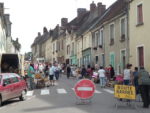Sunday morning, along deep green lanes, just after sunrise. A curve in the road opened onto views of wooded hills and ripe barley. I was back in the Perche in search of both the illustrious and the humble, the cobwebbed and the gilded.
By 6.30h people were steadily setting out their goods for the annual vide grenier. I found a spot to squeeze my van on the bridge hung with cascading flowers, and set off up the winding street. A handful of 19th century notary documents penned in the time of Napoleon caught my eye. They were at a fair price and were gathered swiftly into my bag. Further on I talked with two elderly women who were charming, full of delicacy and smiles as they set out their table laden with antique trinkets. I bought a small oil painting of a coastal view. “To refresh the colour you must rub it with potato,” advised one.
More stalls stood around a small Place in the centre of the village. One vendor had parked his car on the pavement right up against a house and set out his stall in front. A grey haired woman in her nightgown, with a timeless gesture pushed open her bedroom shutters. Leaning out of the window she called down to the owner of the car, “Ah, so your car is also for sale in the brocante? It cannot stay there. What if we need access to our cellar?”
A man in a frayed straw hat and with not many teeth was slowly unpacking boxes. Wine glasses, carafes and jars in need of a good wash emerged from grubby newspaper. As I was attempting to clean off grime to look more closely he said, “I can wash them for you,” and reappeared from his van with a bottle of discoloured water. Swilling out a cobwebby carafe with a flourish he presented it to me for inspection! I did pick out some heavy wine glasses and large kilo size jam jars. He gave a world weary sigh when it came to discussing a price. “Ah, dans le temps, si vous saviez a quel prix je les vendais…” Times (and prices) had changed since his heyday.
When I returned later he hadn’t yet finished his unpacking, and a woman next to me was showing signs of impatience. “Madame“, he countered, “on ne peut pas etre sur le pot et au moulin au meme temps.” One cannot be on the chamber pot and working the windmill at the same time. Evidement.
Before he turned his attention to wrapping my glasses he absent mindedly slapped some ham between two slices of brioche from a plastic bag and then put his snack down amongst the dusty items, a minute later he was muttering to himself, “Mais ou j’ai mis mon casse-croute…?” (but where did I put down my snack?)
The market was less animated than on previous visits – fewer stalls and not quite an air of excitement about it. I remembered a gorgeous pair of gilt wood bedroom chairs in duck egg satin found there some years before, but nothing like that this time. Two enormous galvanised wash tubs with lids had to be bought though. I was trying to avoid buying more watering cans and bassines, much as I love them, but wash tubs make good containers for filling with other purchases I reasoned.
Garages with rough floors and ancient beams opened out onto the street, sheltering trestle tables loaded with old things as well as jars of home-made jam, bunches of spring onions, rhubarb and buckets full of tall, strong basil. I can’t resist buying unruly bunches of garlic. “This will last until next April,” said the Monsieur. He borrowed a pair of weighing scales for sale on the stall next to his, and weighed me out a kilo.
The palette of the little place was so pretty and along its alleys and lanes still stood ruined cottages, rooves collapsed, slates scattered. After this gentle market I sat over a café creme watching the comings and goings against the backdrop of cream shutters against beige walls, beige against pale blue, ochre with blue, taupe with pink.
